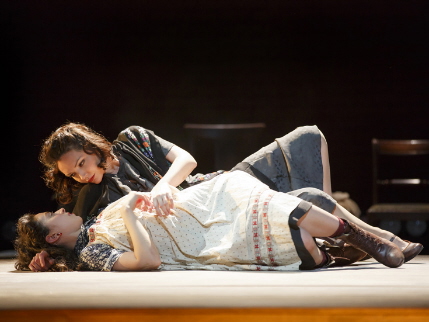
The heroines of the play within a play in Indecent/ Photo by Carol Rosegg
We’re back from our trip to New York to scout out productions you might want to see (or not), shows that might tour South Florida and scripts that might be worth reviving in our regional theaters. Other shows—all nominated for Tony Awards that were held on June 11 – that we have reviewed recently or will review in the next few weeks are War Paint, Bandstand, The Play That Goes Wrong, Groundhog Day, Oslo, Six Degree of Separation and Natasha, Pierre and the Great Comet of 1812. Just search for “Report From New York.”
By Bill Hirschman
If you wonder what the term “coup de theatre” means, it’s easier to illustrated it with a moment from the new play Indecent. A threadbare troupe of Jewish theater players circa 1940 rise from their seats at the back of a nearly bare platform.
They are likely ghosts returned from the dead to perform for us a cherished but nearly forgotten saga that is contemporary and vital for them, but is musty with age like a folk tale for us.
They wear shabby overcoats that speak of poverty and implied prejudice. All at once, they lower their arms and streams of dust flow from their sleeves to the floor in a tableau of mortality.
It is a breathtaking moment redolent of sad poignancy devised by legendary playwright Paula Vogel and director Rebecca Taichman, the kind of punch-in-the-gut visceral moment that you literally can only experience in live theater.
There are several such moments of joy, fear, celebration, disappointment and an overcast of melancholy that characterize this work that can be profoundly moving and yet elicits a feeling that it could be or should be more.
The production at the Cort Theatre, which the Playbill credits as “created by” Vogel and Taichman, successfully conflates the magic of theater, European Jewish culture, anti-Semitism, censorship, the Yiddish Renaissance, lesbianism and the Holocaust. Its tools, besides inventive time-bending dramaturgy, include chameleonic actors portray multiple roles when they are not dancing with abandon while colleagues play the fiddle, clarinet and accordion.
Indecent marks the first time on Broadway for Vogel – the Pulitzer winner for How I Learned To Drive and a revered playwriting teacher-mentor. It’s also a Main Stem bow for Taichman who has worked extensively off-Broadway and in major regional venues.
A visibly stunned Taichman just won the Tony for best direction of play, and, indeed, it’s her vision and staging that makes this evening worthwhile, not Vogel’s well-intentioned earnest script.
The play spins off a real series of events. Around 1907 in Warsaw, a troupe of Jewish actors premiere Sholem Ashe’s God of Vengeance, a then- contemporary tale of a Jewish brothel owner whose daughter falls in love with one of his whores. Creating controversy that such people exist in the Jewish culture, Ashe’s play and the ensuing production quietly accepts the homosexuality as natural, although the fictional father and his society do not. The play ends with the father renouncing his God and forcing his daughter to work as a prostitute in his brothel. But the life-affirming passion of the women’s love is underscored by a key scene late in the work when their souls connect and prepare to make love in the rain.
In Vogel’s play, we follow the continued life of the play through the eyes of Lemml, who becomes so enraptured by the work that he becomes a stage manager. He helms repeated productions by the same troupe until they perform it as a protest in the Lodz ghetto just before they are all shipped off to doom in a concentration camp.
What intrigued this play’s creative team is that when the troupe took the wildly successful play to the United States in 1922, it was performed intact in Greenwich Village. But when the production moved uptown, the cast was arrested for obscenity and could not continue performing unless the key scene was removed.
Although scenes from the play in rehearsal and production are repeated often to chart the drama’s repeated productions across Europe, we, in fact, don’t see that key scene in its entirety until the near the end of Indecent, providing an effective climax.
The entire evening is played on a simple platform with a small cadre of actors who inject scene changes with an infectious celebration of Klezmer music and folk dancing. Because the time and place of each scene ricochets around, the year, location and an occasional epigram are projected in the back brick wall of the stage in both English and Yiddish.
The evening lands most solidly as a resonating cry of the heart if you are any or all of the following: a theater lover, Jewish or gay. It’s hard to assess just how deeply it affects other audience members, but there are sections that don’t quite affect you like you’d think they would. You sense that it’s a play that is respected rather than loved.
The play will not likely tour although it was launched at Vogel and Taichman’s home base with the Yale Repertory, mounted at the LaJolla Playhouse and opened off-Broadway at the Vineyard Theatre before coming to Broadway,
A local South Florida company might be enticed by the subject matter, but be warned that it will take a committed cast and an inspired director to make it work.









 A PaperStreet Web Design
A PaperStreet Web Design
